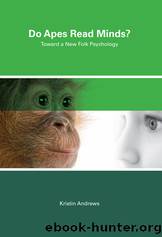Do Apes Read Minds? by Andrews Kristin;

Author:Andrews, Kristin; [Andrews, Kristin]
Language: eng
Format: epub
ISBN: 3339472
Publisher: MIT Press
Published: 2012-08-15T00:00:00+00:00
8
The Science of Folk Psychological Explanation
Child: Mommy, I always ask why. Why do I always ask why?
Parent: Because you are curious about things.
Child: What is curious?
âMaureen Callanan and Lisa Oakes
Aspects of Explanation
In the last chapter, I suggested that theories of FP explanation are descriptive theories, unlike the normative theories of scientific explanation. I described paradigmatic FP explanation as consisting of three distinct elements: a curiosity state regarding a person or her behavior, the explanation seeking, and the generation of an acceptable explanation that resolves the affective tension that drove the explanation seeking in the first place. An FP explanation is information about the social domain that leads one to experience aha! (or at least leads to a decrease in the discomfort associated with cognitive dissonance).
In this chapter, I review the empirical research on explanatory behavior in children and adults to further undermine the claim that folk psychology requires the attribution of the propositional attitudes. We will see that in both children and adults, many explanations of intentional behavior make no reference to propositional attitudes. These data also undermine the idea that the folk think that propositional attitudes are the cause of all intentional behavior. We find that the folk think that some behaviors are caused by moods, emotions, traits, and other nonpropositional features. But we also find that some explanations do not cite causal features at all.
This discussion of what the folk actually do when they engage in explanatory behavior will help to form the account of FP explanation that is developed in the next chapter. With a greater understanding of what we in fact do when we explain behavior, we will be in a better position to answer the four questions regarding what a good theory of FP explanation must consist of.
We can begin by looking at the development of explanation seeking in children. As we will see, infants are already engaged in FP explanatory practices, and young verbal children begin to offer explanations of human behavior before they have much understanding of representational belief.
Explanation Seeking in Children
Infants
When do children begin to wonder why? In many accounts, infants are almost immediate wonderers. Long before they develop the ability to ask why-questions, infants engage in exploratory behaviors and make facial expressions such as pursed mouths and furrowed brows that some developmental psychologists interpret as expressing puzzlement and distress (Gopnik 2000). For Piaget (1936/1952), infantsâ early exploration of their environment and their interest in novelty stem from the childâs need to make sense of the world in which she finds herself. The affective state of curiosity has motivational force (Berlyne 1960; Keller 1987) and drives exploratory behavior (Voss and Keller 1986). Infantsâ early exploratory behavior is a sign of a curiosity state, and I argue that exploratory behavior in the social domain is an early form of FP explanation seeking.
Prelinguistic infants engage in many exploratory behaviors from an early age. According to some accounts, children are already
Download
This site does not store any files on its server. We only index and link to content provided by other sites. Please contact the content providers to delete copyright contents if any and email us, we'll remove relevant links or contents immediately.
Through Windows of Opportunity : A Neuroaffective Approach to Child Psychotherapy by Marianne Bentzen; Susan Hart(962)
Overcoming ADHD Without Medication : A Guidebook for Parents and Teachers by Children and Natural Psychology Association for Youth; Children The Association for Youth(898)
Out of the Mainstream: Helping the Children of Parents with a Mental Illness by Loshak Rosemary;(892)
Delphi Collected Works of Sigmund Freud (Illustrated) by Sigmund Freud(654)
The Noom Mindset by Noom(595)
The 48 Laws of Mental Power: Overcoming Trauma and Building Mental Strength by Victor O. Carl(559)
The Psychology of Media and Politics by George Comstock & Erica Scharrer(483)
Sigmund Freud by Janet Sayers;(481)
MANIPULATION & MIND CONTROL: The Persuasion Collection: Dark Psychology Secrets, Analyze & Influence People with Nlp. How to learn Reading Friends and Develop Body Language Skills. by ROBERT TOWER(466)
It's nobody's fault: new hope and help for difficult children and their parents by Harold Koplewicz(451)
Totem and Taboo: Some Points of Agreement between the Mental Lives of Savages and Neurotics by Sigmund Freud(443)
Behold the Monster by Jillian Lauren(442)
The Hypnotic Coach: A Conversational Hypnotherapy Tool Kit by Marion Jess(422)
Directions in Technical Writing and Communication by Gould Jay R.;(412)
Mastering Flow: Perform Better, Experience More Joy, and Live a Happier Life by Nils Salzgeber(408)
THE PSYCHOLOGY OF ENTREPRENEURSHIP; New Perspectives by Michael M. Gielnik; Melissa S. Cardon; Michael Frese(391)
Positive Psychology Across the Lifespan; An Existential Perspective by Piers Worth(364)
The Modern Young Man's Guide to Manhood by Wayne Walker(359)
Mind Hacking Secrets and Unlimited Memory Power: 2 Books in 1: Learn How to Improve Your Memory & Develop Fast, Clear Thinking in 2 Weeks + 42 Brain Training Techniques & Memory Improvement Exercises by Sharp Scott(358)
